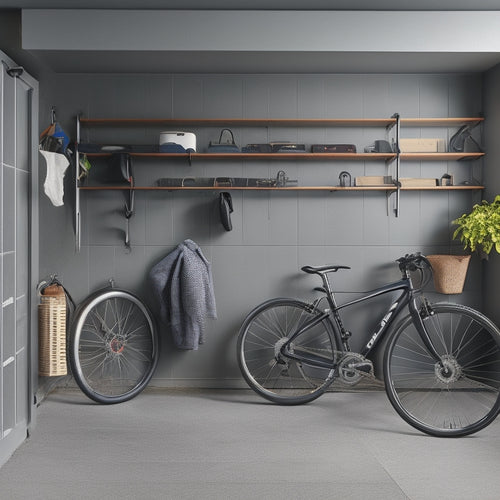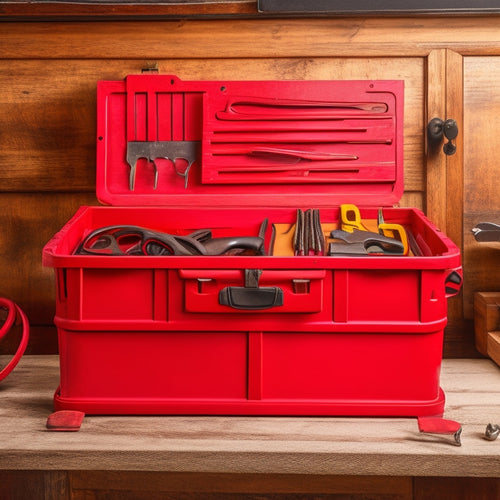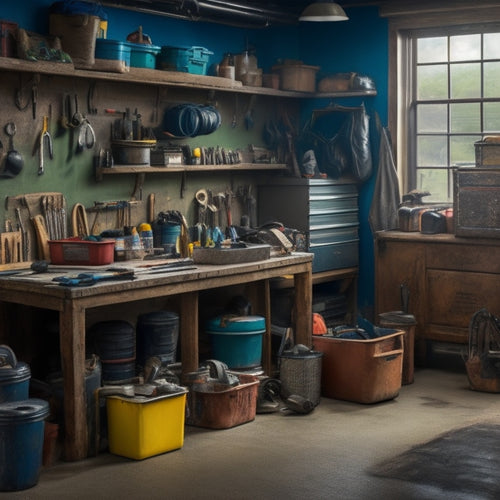
Modular Tool Storage Systems for Small Spaces
Share
You can optimize your small workspace by leveraging modular tool storage systems that intelligently employ vertical space, incorporate flexible design features, and provide customizable organization solutions to enhance efficiency and productivity. These systems employ stackable bins, sliding drawers, and magnetic strips to maximize storage capacity while minimizing floor space. By implementing color-coded organization, mobile tool carts, and pegboard systems, you can quickly access tools and supplies, reduce accident risks, and improve productivity. As you investigate these innovative storage solutions, you'll uncover how to tailor your workspace to your unique needs and workflow.
Key Takeaways
- Modular tool storage systems optimize small spaces by utilizing vertical storage, stackable bins, and compact shelving options for efficient organization.
- Customizable storage solutions with color-coded organization, mobile tool carts, and pegboard systems enhance storage capacity and visibility in small areas.
- Durable and versatile materials like steel, aluminum, and plastic ensure corrosion resistance and withstand daily use in compact storage systems.
- Affordable storage solutions include DIY approaches, repurposed containers, and secondhand shopping to maximize space without high costs.
- Modular systems offer flexibility and scalability, allowing for easy addition of new components as tool collections grow, ensuring efficient use of available space.
Benefits of Modular Storage
With the increasing demands on workspace efficiency, it's no wonder that modular tool storage systems have become a staple in many industries.
You're likely looking for ways to optimize your workspace, and modular storage can help you achieve that. By using sustainable materials, you'll not only reduce your environmental footprint but also guarantee a safe working environment.
Modular tool storage systems offer the flexibility to customize your storage solutions according to your specific needs. You can easily add or remove modules as your requirements change, making it a cost-effective solution in the long run.
Mobile storage is another significant advantage of modular tool storage systems. You can easily move modules around to different areas of your workspace, allowing you to work more efficiently.
This mobility also enables you to respond quickly to changing project requirements or workstation layouts. By keeping your tools and equipment organized and within reach, you'll reduce the risk of accidents and injuries, making your workspace a safer and more productive environment.
Space-Saving Design Features
As you design your modular tool storage system, maximizing space is essential to maintaining a clutter-free and efficient workspace. To achieve this, incorporate space-saving design features that optimize every inch of your storage area.
Start with stackable bins and sliding drawers that allow you to store more tools in a compact footprint. Foldable racks and collapsible containers provide flexibility and can be easily stored when not in use.
Magnetic strips and pegboard panels offer a convenient way to hang tools, keeping them organized and within easy reach. Corner shelves and wall-mounted hooks employ often-wasted space, providing additional storage for less frequently used items.
Customizable Tool Organization
Your modular tool storage system's success hinges on its ability to adapt to your unique needs and workflow. This is where customizable tool organization comes into play. By incorporating color-coded organization, you can categorize tools by type, frequency of use, or project-specific requirements.
Mobile tool carts and wall-mounted solutions provide flexibility in your workspace, allowing you to move tools to where they're needed most.
Drawer inserts and pegboard systems enable you to maximize storage capacity while maintaining tool visibility. Implementing labeling techniques guarantees that tools are easily identifiable, reducing the risk of misplacement or loss.
With quick access storage, you can retrieve tools efficiently, saving time and increasing productivity. Modular workbenches can be configured to accommodate specific tasks or projects, streamlining your workflow.
Compact Shelving Options
Frequently, storage space is at a premium in workshops and garages, making compact shelving options an vital component of a modular tool storage system.
You'll want to choose shelf materials that are durable, resistant to corrosion, and easy to clean. Powder-coated steel or aluminum shelves are excellent options, as they're sturdy and can withstand heavy loads.
When selecting compact shelving options, consider the weight capacity and adjustability of the shelves. Look for shelves with adjustable heights and depths to accommodate tools of varying sizes.
You should also verify the shelves are secure and won't topple over. Installation tips include anchoring the shelves to the wall or floor, and using anti-tip brackets to prevent accidents.
Proper installation is essential to guarantee your compact shelving system is safe and functional. Follow the manufacturer's instructions carefully, and consider consulting a professional if you're unsure.
Maximize Vertical Storage Space
By incorporating vertical storage components into your modular tool storage system, you can capitalize on the often-underutilized space between the floor and ceiling, thereby increasing your overall storage capacity without sacrificing precious floor space.
This is particularly useful in small spaces where every inch counts.
Consider wall-mounted systems, such as pegboard solutions, that allow you to hang frequently used tools and accessories within easy reach. Overhead racks and ladder shelves can be installed to store less frequently used items, keeping them out of the way but still accessible.
Storage bins and stackable containers can be used to store small parts and supplies, while shelving brackets can be added to support heavier items.
Don't forget to employ ceiling storage by installing hanging organizers or overhead storage bins to store items like seasonal decorations or infrequently used tools.
Even a vertical garden can be incorporated into your system, providing a unique storage solution for small items like nuts and bolts.
Tool Accessibility and Ergonomics
Optimize your modular tool storage system by placing tools and accessories at comfortable heights and distances, ensuring that you can access them without straining or overreaching.
This fundamental principle of ergonomics is essential for tool safety and workspace efficiency. When tools are within easy reach, you're less likely to strain your back, neck, or shoulders, reducing the risk of injury.
Position frequently used tools at waist level, while less frequently used ones can be stored above or below.
Consider the weight and size of tools, storing heavier ones at the bottom to prevent them from falling and causing damage.
Label each storage compartment to quickly identify the contents, saving you time and reducing frustration.
Durable and Versatile Materials
Modular tool storage systems rely on durable and versatile materials to withstand the rigors of daily use. When choosing a modular tool storage system for your small space, you need materials that can handle the weight and frequency of tool usage.
Material durability is essential in ensuring the system remains functional and safe over time. You want materials that can resist corrosion, scratches, and fading. Versatile applications of these materials also enable you to customize your storage system to fit your specific needs.
Here is a comparison of common materials used in modular tool storage systems:
| Material | Characteristics |
|---|---|
| Steel | Durable, resistant to corrosion, heavy-duty |
| Aluminum | Lightweight, corrosion-resistant, versatile |
| Plastic | Affordable, water-resistant, easy to clean |
| Wood | Aesthetically pleasing, durable, moisture-sensitive |
Modular System Expansion
As you continue to grow your tool collection, you'll likely need to add new components to your modular tool storage system.
You can easily do this by integrating new modules that accommodate specific tools or accessories, allowing you to customize your storage setup to meet your changing needs.
Additionally, you can upgrade existing modules to increase their capacity or functionality, ensuring your system remains efficient and organized.
Add New Components
Two primary benefits of a modular tool storage system are its flexibility and scalability. You can easily add new components to your existing setup as your tool collection grows or changes. This adaptability guarantees your storage system remains organized and efficient, even in small spaces.
When you need to add new components, consider stackable bins or interlocking trays for storing small parts and supplies. Portable carts and wall-mounted units provide additional storage and can be easily rearranged as needed.
Drawer organizers and tool racks keep frequently used items within easy reach. Pegboard systems and magnetic strips offer customizable storage for hanging tools and accessories. Collapsible boxes and rolling cabinets provide flexible storage solutions for larger items.
When selecting new components, prioritize safety and durability. Look for high-quality materials and construction that can withstand the demands of your workspace.
Confirm the new components integrate seamlessly with your existing system, and consider the overall workflow and ergonomics of your space. By thoughtfully adding new components, you can maintain a safe, efficient, and organized workspace that supports your productivity.
Upgrade Existing Modules
When your existing modules no longer meet your storage needs, upgrading them becomes a cost-effective and efficient solution. You can breathe new life into your existing system by incorporating modern upgrade techniques that enhance module compatibility.
This approach allows you to build upon your existing infrastructure, reducing waste and saving you money.
Some key considerations when upgrading your existing modules include:
-
Assessing module compatibility: Confirm that new components are compatible with your existing system to guarantee seamless integration.
-
Evaluating storage capacity: Determine the ideal storage capacity for your upgraded modules to maximize efficiency.
-
Selecting durable materials: Choose materials that can withstand heavy use and harsh environments to guarantee longevity.
-
Considering ergonomic design: Design your upgraded modules with ergonomics in mind to reduce fatigue and improve productivity.
-
Implementing safety features: Incorporate safety features, such as secure latches and stable shelving, to prevent accidents and injuries.
Affordable Storage Solutions
You're likely working with a limited budget, but that doesn't mean you have to sacrifice functionality in your modular tool storage system.
You can find budget-friendly storage options that won't break the bank, such as repurposed containers or DIY shelving units.
Budget-Friendly Storage Options
One of the primary concerns for many individuals and organizations is finding affordable storage solutions that meet their specific needs without breaking the bank.
You're not alone in this quest for budget-friendly storage options. Fortunately, there are several creative DIY storage solutions that can help you maximize your space without draining your wallet.
Consider the following affordable storage ideas:
- Repurpose old pallets or crates to create multi-purpose furniture that doubles as storage units
- Employ wall-mounted shelves and hooks to keep frequently used tools within easy reach
- Invest in stackable plastic bins or containers to store small items like nuts, bolts, and screws
- Create a pegboard using a wooden board and hooks to hang tools and accessories
- Upcycle an old bookshelf or cabinet to store larger tools and equipment
Space-Saving Design Ideas
How can you optimize your tool storage system to make the most of the available space? By incorporating space-saving design ideas, you can maximize your storage capacity while maintaining a safe and organized workspace.
Consider implementing creative configurations that employ vertical space, such as stackable storage bins or hanging pegboards. This will help keep your tools and equipment off the floor, reducing clutter and tripping hazards.
Additionally, opt for compact tools and equipment with minimalist aesthetics to minimize their footprint.
Incorporate multi-functional storage solutions, like tool chests with built-in workstations or storage cabinets with adjustable shelves. These will enable you to store more tools in a smaller area while keeping them easily accessible.
Cost-Effective Solutions Found
Optimizing your tool storage system's space-saving design is just the beginning. To make the most of your small space, you need cost-effective solutions that won't break the bank. Fortunately, there are several affordable alternatives and DIY solutions that can help you achieve your goal.
-
Repurpose old furniture: Consider using an old bookshelf or cabinet to store your tools. With a little creativity, you can turn an old piece of furniture into a functional tool storage system.
-
Employ wall space: Installing pegboards or hooks on your walls can provide additional storage for your tools. This will help keep your tools organized and within reach.
-
Invest in stackable containers: Stackable containers are a great way to store small tools and parts. They're affordable, easy to label, and can be easily accessed when needed.
-
Create a tool cart: A tool cart can provide a mobile storage solution for your tools. You can build one yourself using an old dolly and some wood, or purchase a pre-made one.
-
Shop secondhand: Consider shopping at secondhand stores or online marketplaces for used tool storage systems or materials. You can often find great deals on gently used items that can help you save money.
Frequently Asked Questions
Can I Mix and Match Components From Different Manufacturers?
You can try mixing and matching components from different manufacturers, but be certain to check component compatibility and follow each manufacturer's guidelines to guarantee a safe and secure assembly that meets your specific needs.
Are Modular Tool Storage Systems Suitable for Outdoor Use?
When selecting outdoor storage, you'll want to ascertain the system you choose offers weather resistance and outdoor durability, as you'll be exposing it to harsh conditions; look for rust-resistant materials, waterproof seals, and UV protection to confirm a safe and reliable storage solution.
How Do I Clean and Maintain the Storage System?
Delicately dusting and deliberately disinfecting daily, you'll deter dirt and damage. Employ effective cleaning techniques, such as soft-bristled brushing and mild soap solutions, and follow maintenance tips like regular lubrication to keep your storage system in top condition.
Can I Anchor the System to the Wall for Added Stability?
You'll want to contemplate wall mounted options for added stability enhancements; anchor the system to the wall using sturdy screws or brackets to prevent tipping or collapse, ensuring your safety and protecting your tools and investment.
Are There Any Discounts for Bulk or Bundle Purchases?
When exploring bulk purchase options, you'll find that many retailers offer bundle savings benefits, allowing you to maximize your investment.
Conclusion
As you gaze upon your newly organized workspace, you're surrounded by a sense of calm and control. Tools are at your fingertips, and every inch of space is maximized. Your modular tool storage system is a harmony of efficiency, with each component working in unison to create a customized haven for your most prized possessions. With every glance, you're reminded that a clutter-free space is not only a productivity powerhouse, but a beautiful thing to behold.
Related Posts
-

Large Wall Hooks to Maximize Garage Space
You can effectively double your garage's storage capacity by installing large wall hooks that keep items off the floo...
-

Portable Tool Chest Essentials
When stocking your portable tool chest, you'll want to prioritize essential hand tools like hammers, tape measures, a...
-

Best Cheap Tool Boxes for Budget-Conscious Buyers
You need a reliable tool box that gets the job done without breaking the bank. Look for durable materials, rust-resis...


